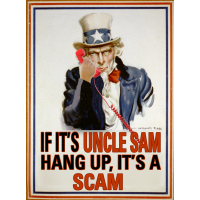Congress Forces IRS to Use Private Bill Collectors

A law going into effect this month is forcing the Internal Revenue Service (IRS) to employ private debt collection companies, a plan which will not only cost the agency money, but will make it easier for scammers to defraud Americans.
The provision, which is buried in the new $305-billion highway bill passed by Congress, means that bill collectors will be using the same tactics to collect tax debt as they do for a late credit-card payment. That concerns IRS officials, who have long warned Americans not to take seriously calls from scam artists claiming to be from the agency.
IRS Commissioner John Koskinen told The Washington Post that the agency’s traditional message has been “if you are surprised to be hearing from us, you’re probably not hearing from us because you won’t hear from us first by phone.”
That won’t be the case anymore, as he told a Senate committee last summer. “So now if you suddenly have private debt collectors calling up, saying they’re from the IRS, they’re going to run into the work that we and the inspector general and everybody else has had warning taxpayers,” Koskinen said.
“There is a risk calls from private debt collectors will muddy that message,” national taxpayer advocate Nina Olson told the Post. “There is also a risk scammers will study the dynamics of the private collection agency calls and try to mimic them to fool taxpayers. As the IRS develops the program’s procedures, it will have to take steps to minimize the risk of taxpayer confusion.”
The chances for such confusion have been greatly increased because of the scam, prevalent during the past two years, whereby someone purporting to be from the IRS calls a taxpayer and demands immediate payment of a supposed tax debt via debit card or wired funds. The Treasury Inspector General for Tax Administration reported that, during that time, it “has become aware of approximately 4,550 victims who have collectively paid over $23 million as a result of the scam.” The problem has been getting increasingly worse, as nearly 3,000 victims have lost a total of $14 million during the first three quarters of 2015 alone, according to the agency’s October report.
“This scam has proven to be the largest of its kind that we have ever seen,” Inspector General J. Russell George told the Post. “The callers are aggressive, they are relentless, and they are ruthless. Therefore, it is imperative that the IRS effectively educates taxpayers and debt collectors to ensure that the scammers don’t have another vehicle in which to engage in their illegal activity.”
Sen. Chuck Grassley (R-Iowa), who supports the debt collector provision, claims collection agencies will probably contact debtors via letter first, although there’s nothing in the legislation that requires it.
Use of private collection agencies to collect taxes was scuttled twice in the past 20 years, according to a statement by Tony Reardon, president of the National Treasury Employees Union. Both of those attempts lost money for the federal government, the Post reported. “The third time won’t be the charm,” promised Reardon. “Reviving the experiment again will deliver the same disastrous results.”
-Steve Straehley, Danny Biederman
To Learn More:
Will Scammers Hide Behind New Law for Private Tax Collectors? (by Joe Davidson, Washington Post)
IRS Seizes Money and Property without Criminal Charges (by Noel Brinkerhoff and Steve Straehley, AllGov)
Understaffed IRS Expected to Cut Back on Enforcement…and Help (by Noel Brinkerhoff and Danny Biederman, AllGov)
- Top Stories
- Unusual News
- Where is the Money Going?
- Controversies
- U.S. and the World
- Appointments and Resignations
- Latest News
- Trump Orders ICE and Border Patrol to Kill More Protestors
- Trump Renames National Football League National Trump League
- Trump to Stop Deportations If…
- Trump Denounces World Series
- What If China Invaded the United States?






Comments